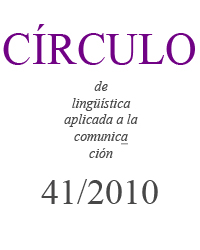Pragmatic strategies in television advertising
Keywords:
publicidad, pragmática, incertidumbre, retóricaAbstract
According to Rosser Reeves, advertising proves to an audience that a product has some features that make it unique among its competitors; providing the viewer with a reason to buy it. In this article, taking into account both the empirical analysis of a corpus of 50 TV ads and the theories of the publicist David Bernstein (1974) and the pragmatist Paul Simpson (2001), we define two rhetorical procedures for laying out this kind of information: on one hand, we have reason ads that are direct, simple and clear; on the other, we have tickle ads that insinuate more than they say. We define both kind of rhetoric and we identify the predominant one that in a particular ad, analyzing the development of the discourse of the advertising and the type of information that comes up at each particular moment. Thus, two kinds of publicity will have been described but also elements that work as constituents of the commercial message will have been pointed out. This will allow us to predict its disposition taking into account the rhetorical strategy chosen by the publicist.Downloads
Published
2010-03-01
Issue
Section
ARTÍCULOS/ ARTICLES

